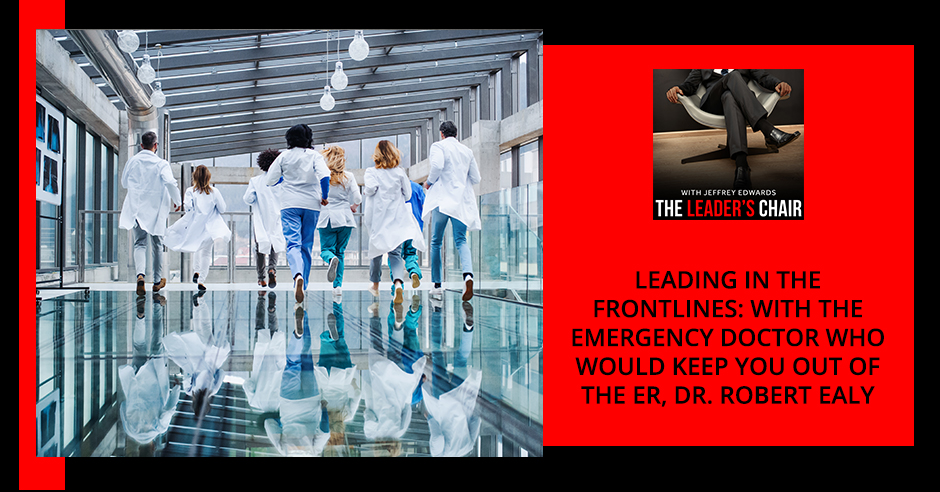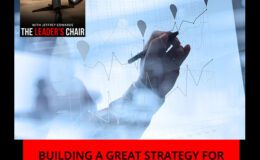
The emergency department is full of heroes, but Dr. Robert Ealy goes one step further. Based in Indiana, he has been leading the frontlines for over 30 years, both inside the emergency room and out. Robert sees to it that people are not just given optimum urgent care, but also the knowledge and tools to avoid being rushed to ER in the first place.
As a speaker and coach, Robert helps people understand what health and wellness is really about, to change their habits and their lives. In this conversation, I got to learn about Robert’s dedication towards service that makes a difference.
Check out this episode if you want to learn:
- How to keep out of the emergency department!
- Why it’s vital for leaders to take care of their health — both mental and physical
- How to inspire those around you to achieve their dreams
🎧 Listen to the podcast here:
Leading In The Frontlines: With The Emergency Doctor Who Would Keep You Out Of The ER, Dr. Robert Ealy
What inspired you to go down this path?
For me, it started with my family doctor, Dr. Weinreb. He was more than a physician — he was a healer. This guy used to make house calls. When I was growing up, he wasn’t just taking care of us, he was (also) breaking up some of the fights my parents (were) going through at that time. He helped keep our young family together, (and that) influenced me tremendously. I wanted to make a difference to help people, (and to show) that they do have a chance.
What drew you to emergency medicine specifically?
You never know what’s coming in. Family practice doctors, internal medicine doctors, when they have appointments with their patients, they know what’s coming in.
I (have gone from treating) a 12-year old (whose) body (was) cut in half from a boating accident, to another 12-year old, a couple of minutes later, (with) an ear infection. We never know what’s coming in (and we) treat a variety of illnesses.
'Lead by example.' Share on XAs emergency medicine physicians, (we) don’t say ’emergency room’ — it’s ’emergency department’. Being called (an) ’emergency room doctor’ is like an insult. We’re more than that, because you have to get board-certified in emergency medicine.
In the old days, (when a) family doctor (said) ‘I’m semi retired’, (they could) work in (the) emergency department. You can’t do that (today) because in emergency department, you have to be able to put someone on the ventilator, put chest tubes in, do a thoracotomy, which means you open a person’s chest and massage their heart.
I imagine when you have a trauma case come in, you’re somewhat like a coach, leading your team. You mentioned Dr. Weinreb — what have you learnt from other mentors throughout your career?
You lead by example. It is a team in the emergency department. You get to know the nurses, (and) they get to know your style, particularly when a trauma patient comes in, because sometimes you (don’t have) any time to say things. They know what (I’m) going to do, (and) I know what they’re going to do next.
I always praise people out of habit, because most people won’t give (it), and I didn’t get enough praise growing up. If something goes awry, I (say) it was my fault, even though it may not have been my fault. Deep down inside, (people) appreciate getting praise.
You’re at the front lines, helping people everyday, and you see the mistakes they’re making in their lifestyles. How do you use your platform to promote better health?
To be frank with you, instead of getting the truth, a lot of people want a nice white lie. I can have some young lady or fellow (that might) be overweight, and the cause of their knee pain is because of they’re overweight. A lot of times you have to give people a nice white lie.
A lot of doctor’s offices are owned by the hospitals. It’s imperative that you get good Press Ganey Scores, which is means patient satisfaction scores, because good patient satisfaction equals good reimbursement. You’re taking care of the patient, but you have to keep (the scores) in the back of your mind.
Unfortunately, it’s less about good medical care versus getting good patient satisfaction scores.
How do you define good patient care?

Frontline Leader: Unfortunately, hospitals sometimes prioritize getting good patient satisfaction scores instead of ensuring good medical care.
That’s easy for me: doing what’s right for the patient — not necessarily what’s right for the hospital — and imagining that (that) patient was a relative of yours that you liked, cared about or respected.
You say you’re the ‘stay the hell out of my emergency department’ doctor. Where does that come from?
A lot of the things I see in emergency department are preventable, meaning that if you eat better, exercise regularly and things like that, you won’t be in an emergency department.
When I talk to high school students, I tell them, ‘you need to take back your health and be responsible for your own life, because it’s your responsibility — it’s not the doctors’ (or) the pharmaceutical companies.’ If you are taking care of yourself by trying to eat better, exercising and taking supplements, you won’t be in emergency department.
One of my better examples is diabetes, as well as high blood pressure. If a nurse comes and tells me, ‘We have a 40-year-old that’s diabetic’, I (can) tell you without going in the room (that) they’re overweight. They call it Type Two diabetes.
Being overweight causes a lot of secondary problems — elevated cholesterol, diabetes, high blood pressure. If you’ve taken care of yourself, you won’t be in my emergency department.
There’s a big focus on promoting wellness to corporate executives, saying not to work 70 to 100 hours a week, or you’ll pay the price one day. How can business leaders be taking better care of their health?
A handful of days when I have to be at work at 8AM, I’m up at 3AM to work out for one and a half, two hours. Is it easy to do? Is it not so easy to do? In general, when I work out, I feel better. It’s a balancing thing.
When you’re (starting out), you’re going to be spending a lot of time building your business, but sometimes you need to carve out a little bit of time to try to work four, five or six times a week. That endorphin rush may help you with creativity in your business. You also have to make sure you have family time and appropriate sleep time. You don’t need to sleep as much as people think (you) do. This eight hours stuff, I don’t know who came up with that.
'Do what’s right for the patient, not necessarily what’s right for the hospital.' Share on XIt’s easy to do, but it’s not so easy to do. I remember when I first started working out, I couldn’t be on a StairMaster for 10 to 15 seconds. Now, I’m running 10,000 (steps) at 64 years old.
Congratulations, Doctor! I’ve got to catch up with you.
I don’t tell you this to brag. I don’t like to run, but when I started running in 2019, (I thought), if I could do some stuff I don’t like to do, how is that going to spill over to other things in my life?
What do you see your role as being when it comes to educating youth about healthy habits?
When I (went) to become a physician, a number of teachers (tried) to dissuade me. They said, ‘Robert, you have this colour problem. We know where you grew up, and no one ever went to college (before) you. Why don’t you become a lab tech?’ I remember it like it was yesterday.
I want to be a beacon of light for kids like me. When I (do) talk to these kids, sometimes (you see) that the light bulb goes on, and it’s a wonderful feeling. I hate when speakers say, ‘If I could touch one person’. Screw that one person stuff! I want to touch all of these kids. Who talks to the downtrodden, to the kids come from a poor background? Nobody does.
It’s a rewarding feeling for me. When I was up there (talking to high schoolers), I remember having an out of body experience: ‘I was born for this.’

Frontline Leader: A lot of the things that can get you to the emergency department are preventable by better food and regular exercise.
What do you want your legacy to be?
It’s short and sweet: ‘he made a difference’. Who helps the downtrodden? That’s my thing.
Of those you’ve spoken to, have any come back to say, ‘Dr. Ealy, thank you’?
I’ve had several people, (including) a younger cousin. She wanted to become a physician. I kept on her case like, ‘You got to be focused.’ At a certain age, you want to be popular, go out to dates — but you have to sacrifice.
Eventually my cousin, she not only became a physician, (but) she’s an emergency medicine physician in Long Island, like me.
What did she say was your influence on her career decision?
She kept on saying (my) words would encourage her. Even though I didn’t see her that often, I was always encouraging her to go for what she wants.
'Hard work pays off.' Share on XWho were the people in your life that pushed you forward?
Mostly, my mother and my father. They would always encourage me, (and tell me) I could do anything.
There’s a lot of haters out there (who) don’t want you to succeed, mostly in the States right now with racial injustice. One of the big time professors at my school at Penn State got up in front of our hundreds of medical students — the class of ‘82 — and said, ‘No minorities should be doctors’ — just like that. He failed all of the minorities in that class.
We had our professor in anatomy, Alphonse Leure-duPree, who (was there) to protect us, and always encouraged us. I remember my father telling me, ‘Your hard work is going to pay off, you (just) don’t see it yet.’ He was right.
It was weird, all these doubters, they’ll (now) come at me telling me, ‘(I knew) you could do it.’ I told them, ‘You wouldn’t give me the time of day when I was going through school!’
I have a brother, Anthony, who is a successful business person. We were supposed to be another statistic, and that’s why I want to talk to kids. I want to make sure they know that someone’s thinking about them, someone they can lean on.
Eventually, I want to become a speaker. I know I can make a difference in (kids’ lives) — someone that believes in them.
📌 Important Links:
Love the show? Subscribe, rate, review, and share!
Join The Leader’s Chair Community today on Facebook and Twitter.





